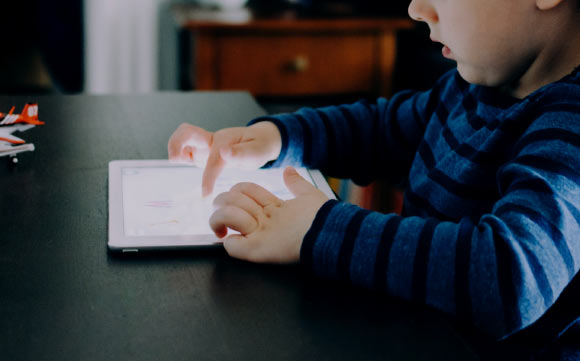Evening use of light-emitting electronic devices such as tablet computers can induce delays in desired bedtimes, suppress secretion of the sleep-promoting hormone melatonin, and impair next-morning alertness, according to a study led by Dr. Jeanne Duffy of Brigham and Women’s Hospital and Harvard Medical School.

Using light-emitting tablet computers in the late evening can postpone our decision to go to sleep, and make us more sleepy the next morning. Image credit: Stock Snap.
“Consumer electronic devices play an important role in modern society,” Dr. Duffy and co-authors said.
“Technological advancements continually improve their utility and portability, making possible the near-constant use of electronic devices during waking hours. For most people, this includes the evening hours close to bedtime.”
“Evening exposure to light-emitting devices can adversely affect circadian timing, sleep, and alertness, even when participants maintain an eight-hour sleep schedule and the duration of evening light-emitting device exposure is limited.”
The researchers tested the effects of evening use of light-emitting tablet computers when participants were allowed to self-select their bedtimes, with wake times fixed as on work/school days.
The study involved nine healthy adults (six men, three women) aged 25.7 years.
They were studied individually and lived in light and sound-attenuated research rooms at the Center for Clinical Investigation at Brigham and Women’s Hospital.
The team compared five consecutive evenings of unrestricted use of light-emitting tablet computers versus evenings reading from printed materials.
On evenings when using light-emitting tablets, participants’ self-selected bedtimes were on average half an hour later, and they showed suppressed melatonin levels, delayed timing of melatonin secretion onset, and later sleep onset.
When using the tablets, participants rated themselves as less sleepy in the evenings and less alert in the first hour after awakening on the following mornings.
“We found that unrestricted evening use of a light-emitting tablet computer led to self-selection of later bedtimes, and this was associated with suppression of melatonin, decreased evening sleepiness, delayed circadian rhythm timing, later sleep onset, and increased morning sleepiness compared to evenings with unrestricted use of only printed materials,” the study authors said.
“Our results are consistent with findings from previous laboratory studies and indicate that light-emitting device use in the evening has multiple impacts on physiology and behavior, potentially explaining findings from epidemiologic studies.”
“The findings provide more evidence that light-emitting electronic devices have biological effects,” Dr. Duffy added.
The study was published online May 22 in the journal Physiological Reports.
_____
Evan D. Chinoy et al. Unrestricted evening use of light-emitting tablet computers delays self-selected bedtime and disrupts circadian timing and alertness. Physiological Reports, published online May 22, 2018; doi: 10.14814/phy2.13692







